Priyanka Pulls Back the Curtain
In her most telling interview yet, Priyanka Chopra Jonas addresses the challenges of her past, her biggest ambitions, and what she's taking on next.
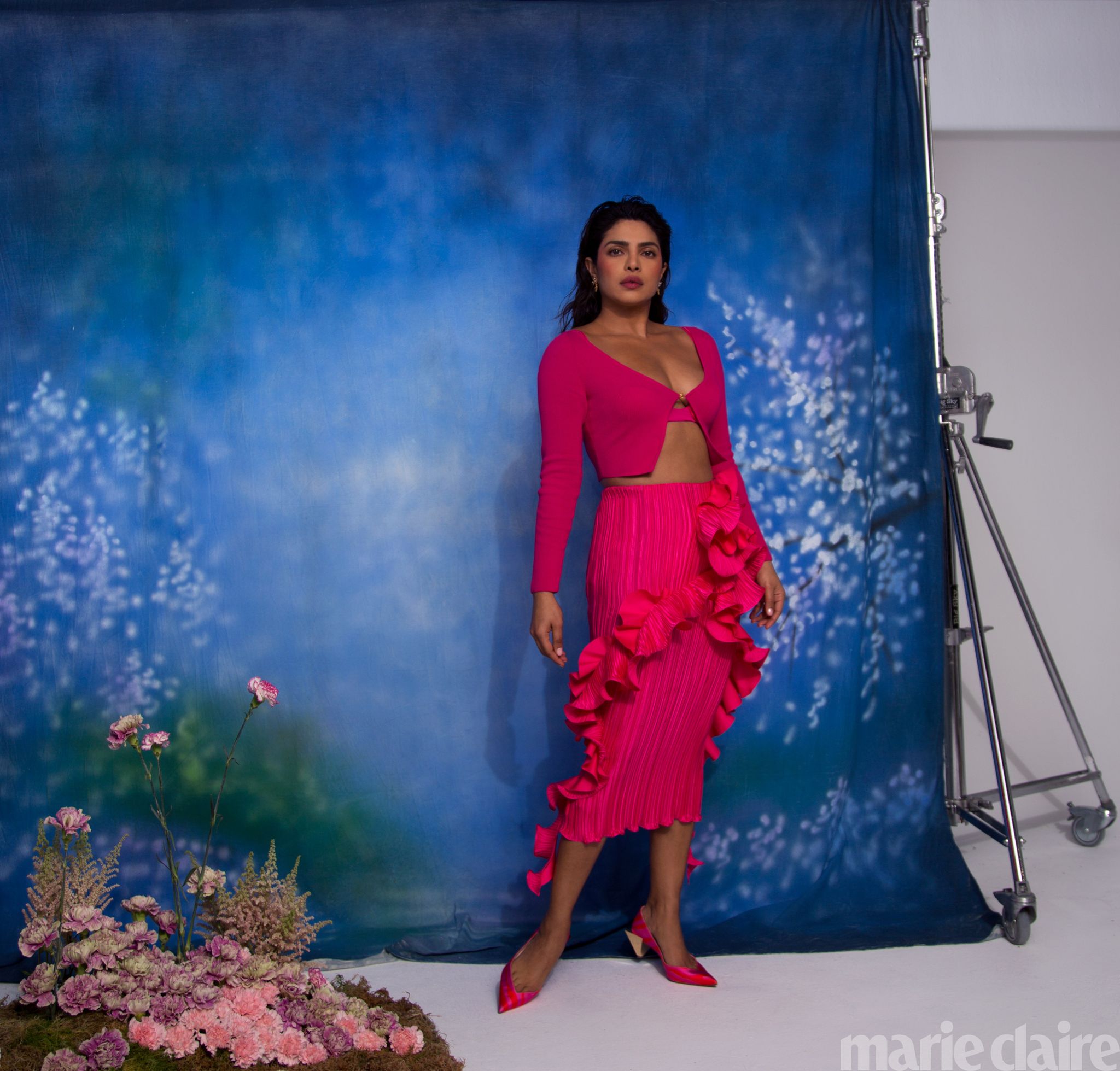
Versace cardigan, bra, and skirt; Dolce & Gabbana earrings; Christian Louboutin shoes
As city- and statewide lockdowns spread last spring following the trajectory of the COVID-19 outbreak, many of us vowed to become our best pandemic selves. Some panic-bought Pelotons to keep up precoronavirus fitness regimens; others were kneading, proofing, and baking bread ad infinitum. Priyanka Chopra Jonas had similar sanguine expectations for herself. But unlike many of us, she succeeded.
It was during quarantine that the Bollywood star turned Hollywood A-lister wrote her memoir, Unfinished (February 9, Ballantine Books), becoming a first-time author. “Casual,” she says, laughing.
Chopra Jonas is talking to me on Zoom from the London home she’s been renting since November. She’s sporting an oversize black sweatshirt and matching sweatpants and is tucked into an uncomfortable-looking chair located in what has seemingly been designated the “office area.” The actress is sequestered in London for nearly all of 2021, filming two projects: the spy series Citadel, from the directors of Avengers: Endgame, for Amazon Studios and the romantic drama Text for You, costarring Celine Dion.
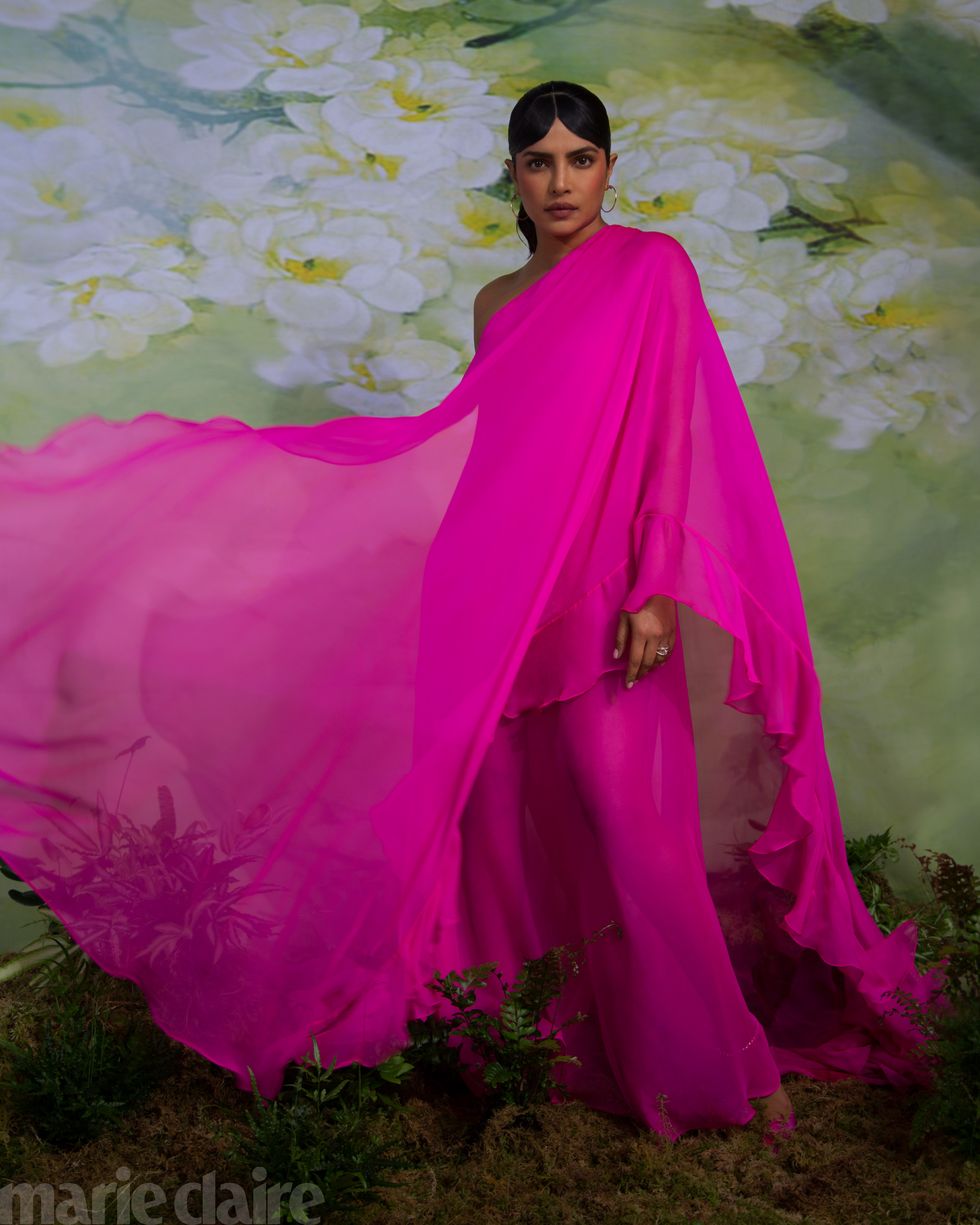
We’re here to discuss the huge year Chopra Jonas has ahead of her. In addition to the release of Unfinished, she’s starring in The White Tiger, out in January on Netflix, which she also produced, and is debuting her own hair-care brand, Anomaly, in Target in February. Chopra Jonas will close the year with the next installment of The Matrix, out in December, and start working on an Indian-wedding buddy comedy with Mindy Kaling, due in 2022. But first, we’re talking about something right in front of our faces: quarantine bangs.
“It was one of these quarantine decisions, which I could have completely regretted, but I play a sad writer in this next movie,” says Chopra Jonas as she fluffs the hair on her forehead. “I don’t know why, but I feel like ‘sad writer’ means bangs.”
For the record, Chopra Jonas wasn’t sad when she was writing Unfinished. She was full of purpose. Starting in March, she hunkered down in L.A. with her musician husband, Nick—otherwise known as the most beloved, some would say, of the brothers Jonas—and members of their extended family. It was a rare break from straddling parallel careers in India and Los Angeles, which she has done for six-plus years. For the first time since she was 18, Chopra Jonas suddenly found herself with a free schedule, and she wanted to use the time well.
“It was the opposite of what I would normally do. I love staying in bed in pajamas. It’s my favorite thing,” she says. “But when I had so much time to do that, I didn’t want to do it as much. I saw myself craving a routine.”
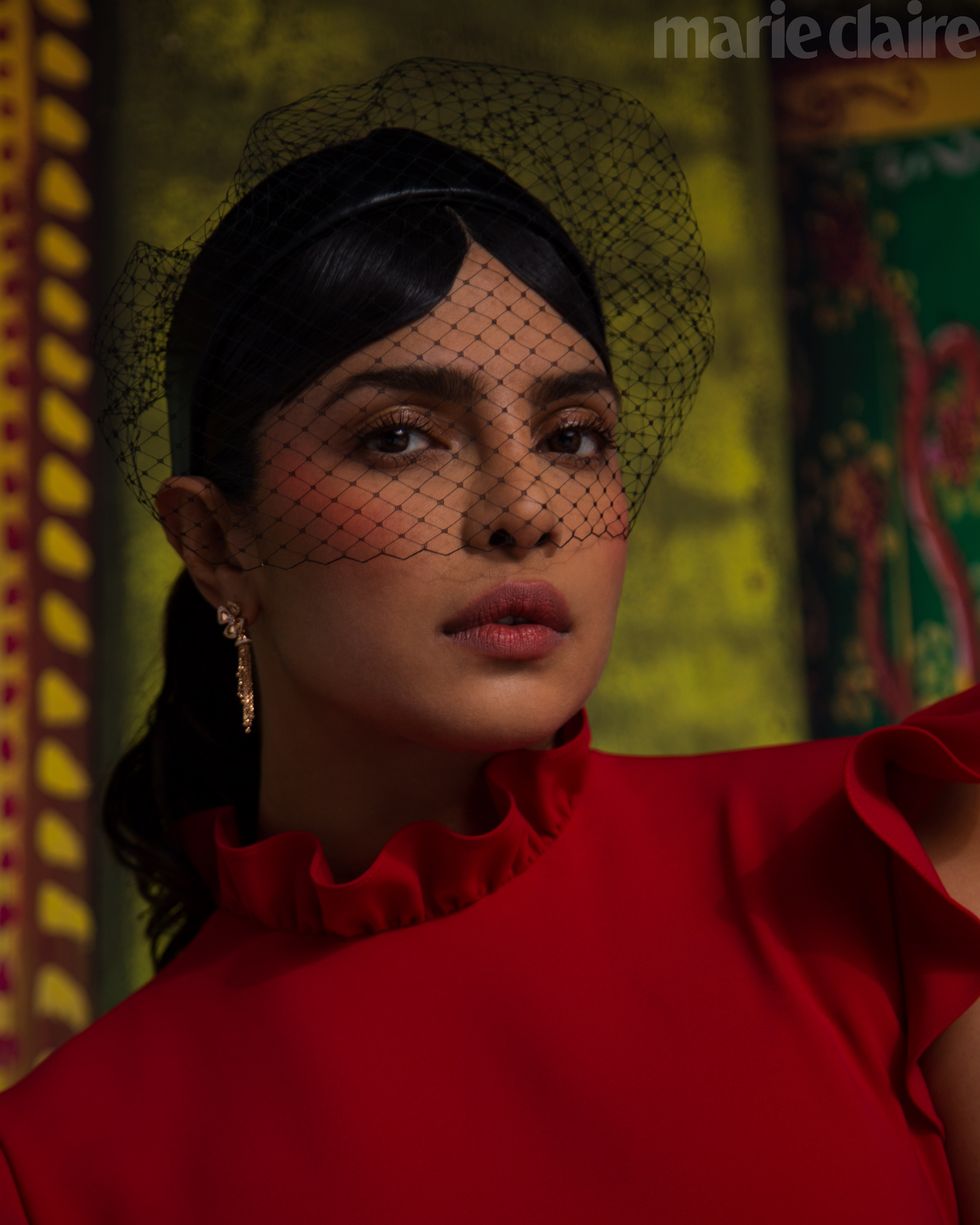
Christian Siriano dress; Dior veil; Bulgari earrings
So, Chopra Jonas reported and wrote, turning to family members, including her mother, Madhu, and her younger brother, Sid, to help flesh out the major moments of her life. She finished the whole manuscript by May.
Next up, she might try screenwriting—now that she’s learned that writers don’t have to be sad after all. “I’ve always been fascinated with writing,” she says. “Having written the memoir, I feel a bit more confident about it. I do want my evolution creatively to be in the writing/directing space.”
She also used the break from her hectic filming schedule to finally decorate the L.A. megahome, just three miles from her brother-in-law Joe Jonas and his wife, Sophie Turner, that she and her husband purchased for a reported $20 million in 2019. “We never get to meet as often as the world thinks we do, but whenever we end up together, it’s a huge-ass party. It’s all our parents, the girls and the boys,” she says of the larger Chopra and Jonas clans. Most important, though, she spent time with her husband—a rarity. Previously, Jonas’s and her careers were so full throttle, they sometimes had only a day or two to themselves every two weeks. “Both of our schedules are so crazy individually that there was no world in which we would have ever had six months together,” she says. “It only took a global pandemic for that to happen.”
Get exclusive access to fashion and beauty trends, hot-off-the-press celebrity news, and more.

Her husband, for his part, estimates that the couple spent just 100 days together in 2019. “We’re both aware that [last year] was really challenging [with COVID-19], but we were able to be together. It was a blessing, and it created a good foundation for us,” he says.
Their wedding at the end of 2018 brought a fanatical amount of media attention. (Who could possibly forget the $200,000 Tiffany cushion-cut diamond ring, the Amazon gift registry, the multiday celebration in Mumbai, Jodhpur, and Delhi?) Indian and Asian fans were well aware of Chopra Jonas’s singular wattage; it’s part of the reason why she has a global fan base with roughly 60 million followers on Instagram, 27 million fans on Twitter, and 118 million results on Google. But some American audiences still underestimated her star power, partly because of how myopically Hollywood-centric the U.S. is. The whirlwind romance with the heartthrob may have quickly garnered her new fans, but Chopra Jonas spent decades earning her chops. Now that her work in Hollywood is picking up even more, she wants her new followers to know where she’s come from.
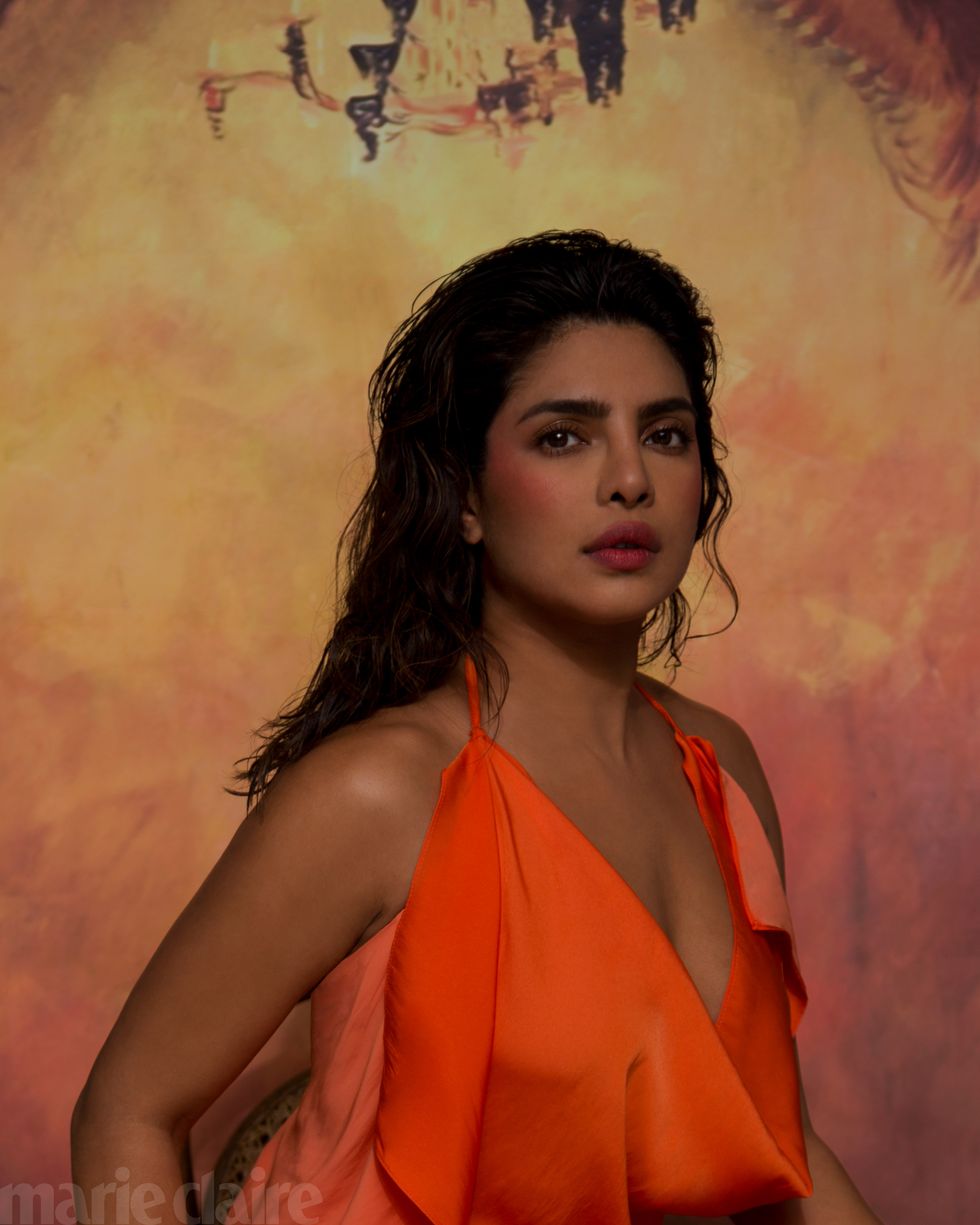
Sportmax dress
“I wanted to commemorate my 20 years in the entertainment industry,” she says of choosing to write about her life now. “I am 38, and I’m just about to start active work in another entertainment business, in another country, all over again.”
Chopra Jonas has played down the magnitude of her transition, even though no other Indian actor has successfully dominated both Bollywood and Hollywood—not even arguably bigger worldwide stars like Amitabh Bachchan, the so-called Robert De Niro of India. After winning Miss India and Miss World in 2000 (with no prior major pageant experience, mind you), she made her Bollywood debut in 2003 in the spy thriller The Hero: Love Story of a Spy. Leading lady status followed in the romances Andaaz and Mujhse Shaadi Karogi, but after a string of flatlined films in the mid-aughts, Chopra Jonas turned to smaller parts with more interesting backstories to find her footing. These nuanced performances eventually made way for Hollywood.
Still, the actress understood that she was going to have to put her Indian celebrity aside to make it in America, essentially starting on the same rung of the ladder as every wide-eyed teenager just arriving in L.A. But that fact didn’t engender anxiety or self-pity—only determination.
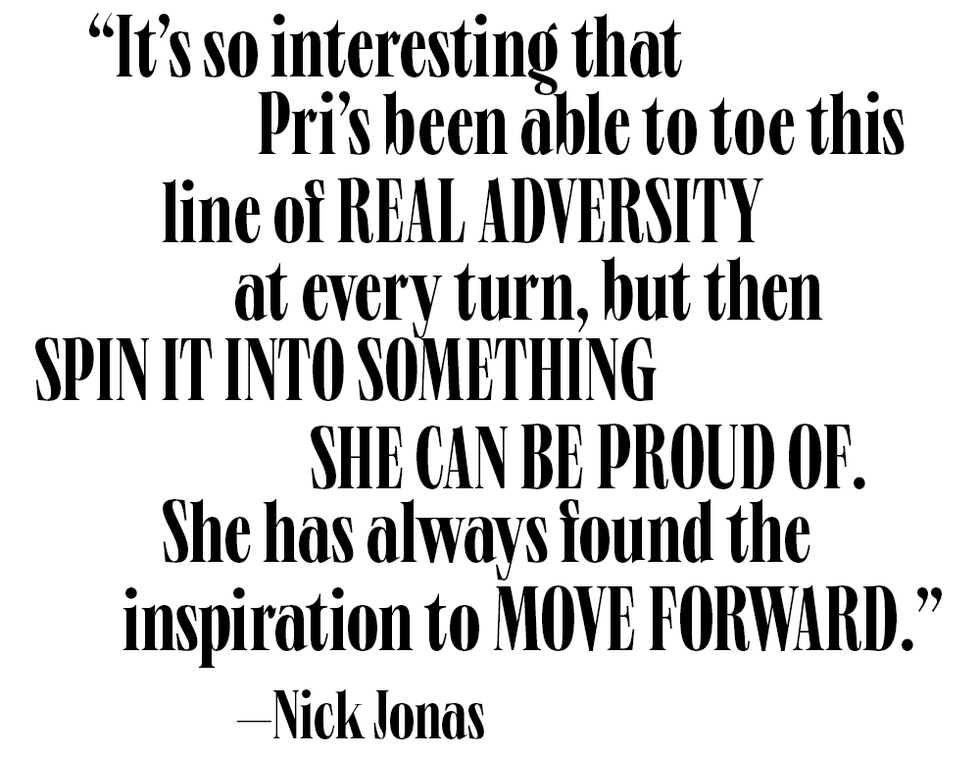
“When I read a trade-magazine article about CAA signing me, it said, ‘CAA Signs Its First Bollywood Star.’ They didn’t even mention my name,” she remembers. “With that headline, I felt the responsibility of the entire [Bollywood] industry was on me.”
The article she’s referring to is from The Hollywood Reporter in 2012, when Chopra Jonas was 29 years old and had no U.S.-based work she could speak of. (Her big break, the three-season ABC drama Quantico, didn’t debut until 2015.) At the time, Chopra Jonas was pursuing a music career and was set to release her debut international album, In My City, with Universal Music Group/Interscope and Desi Hits! Inc. Interscope cofounder Jimmy Iovine, who was responsible for the early careers of Lady Gaga, Eminem, and Tupac Shakur, had taken an interest in Chopra Jonas, believing she had global appeal. He was right; the album’s lead song and video, featuring will.i.am, was nominated for two World Music Awards in 2014.
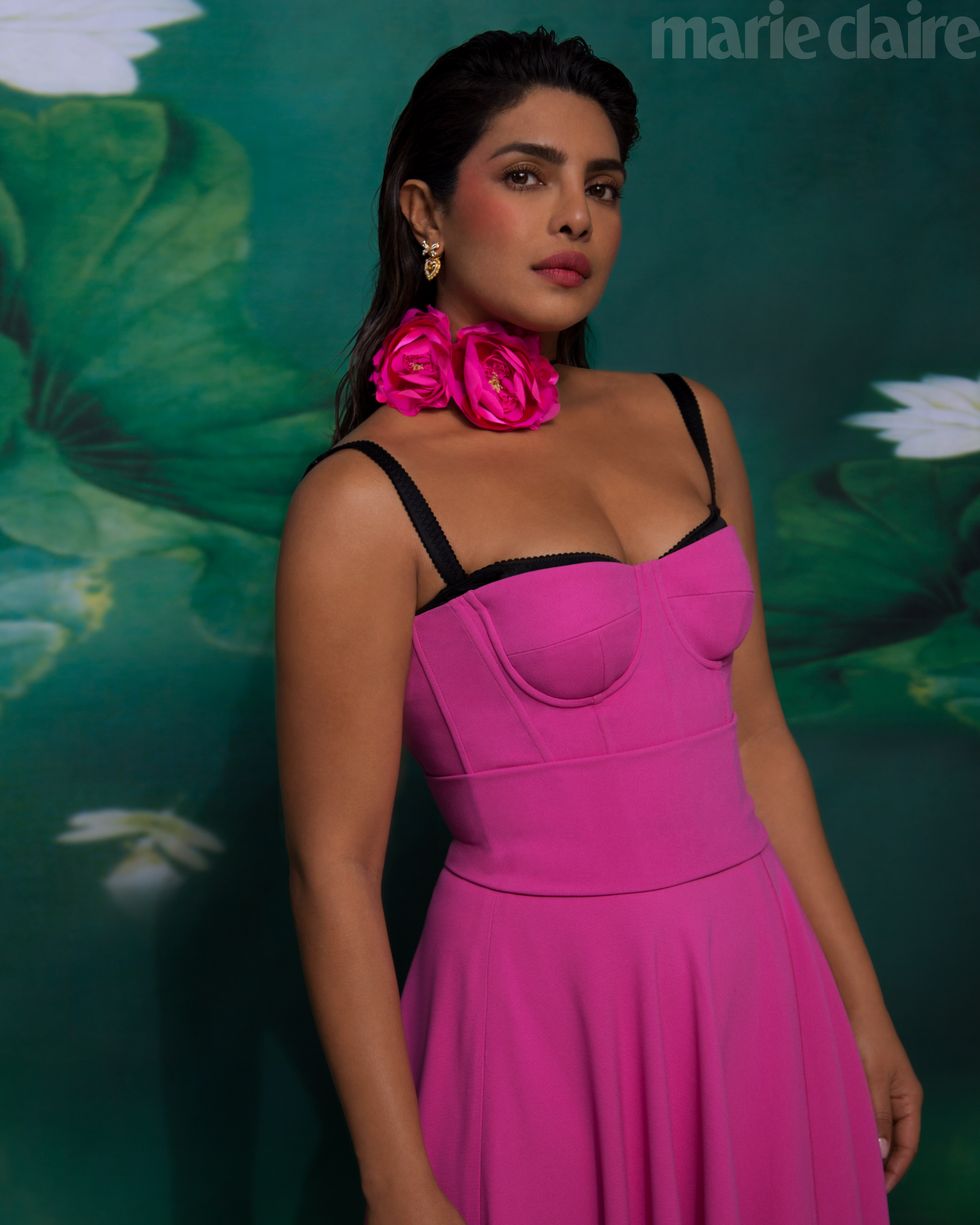
Dolce & Gabbana dress, earrings, shoes, and choker; Bulgari ring
But it did take a while for Chopra Jonas to find her footing. In Unfinished, Chopra Jonas recalls how uncomfortable it was to start over. She had to blindly introduce herself at a Roc Nation pre-Grammys brunch in 2012, no press outlets would write about her, and when she released her debut single, “In My City,” promoting the NFL’s Thursday-night football game, it was met with not just criticism but cruelty. (One tweet: “What’s a brown terrorist doing promoting an all-American game?”)
It wasn't the first time she’d heard comments like that. “It’s so difficult to hear you talk about it right now,” she says when I ask about the racism she’s experienced. She was bullied as a teenager in Newton, Massachusetts, where she lived with her extended family during high school; most of the ire came from a girl named Jenny (a pseudonym). Today, Chopra Jonas still doesn’t completely understand what made her the subject of Jenny’s taunts or side-eye. “In high school, I feel like the kids who were after me didn’t even understand why. I think it’s that they decided that they were more powerful than someone else—me—and when you pick on someone, it’s because you’re insecure,” she says. “Bullying happens to kids and adults. It happens with positions of power, and we’ve all seen that abused in multiple ways.”
Though Chopra Jonas can rationalize the invective now, two decades later, she admits that in high school, “it affected me adversely. It affected my confidence; it affected who I wanted to be. I felt exposed, when your skin is raw.”
Hollywood is itself a harsh place, but Chopra Jonas has accepted that she stands out—and that difference isn’t a bad thing. She recounts a story about attending one of her first Emmy Awards ceremonies five or so years ago: She and comedian Aziz Ansari counted how many South Asians were in the room. “There were six. Aziz was like, ‘This is a lot. Years ago, there were two of us,’” she recalls. “I was cracking up. But that’s what it’s going to take: talent and people who want to work in the industry to see people from different parts of the world. I’m not going to be pigeonholed for the sake of representation.”
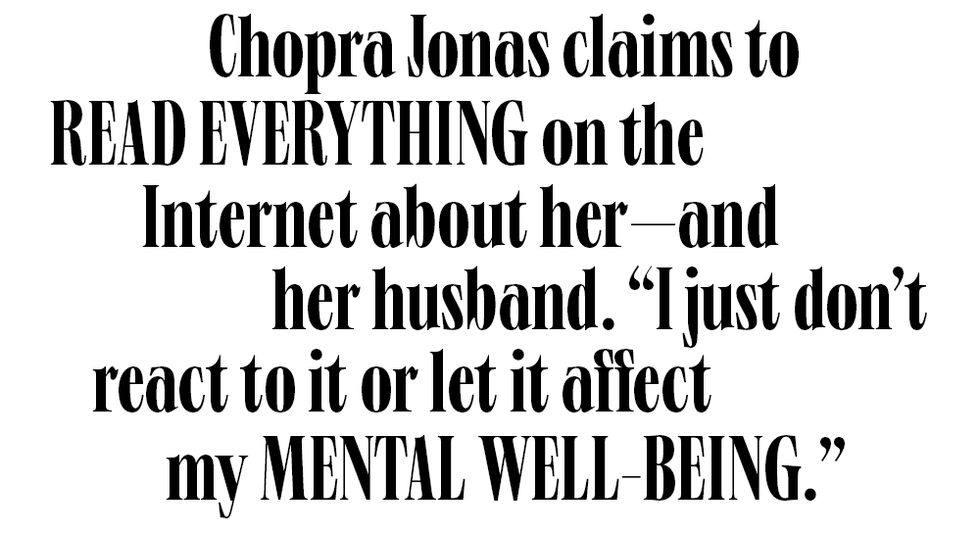
Jonas calls that boldness his wife’s inner super power. “It’s so interesting that Pri’s been able to toe this line of real adversity at every turn, but then spin it into something she can be proud of. She has always found the inspiration to move forward,” he says.
Head-on, not head in the sand, is how she prefers to face things. “I am just like everyone else. In the morning when I’m driving to work or I’m having my coffee, I’m flipping through Twitter, Instagram, the news, and when my name pops up, I’m like, Alright, what are people saying? How are we feeling?” Chopra Jonas claims to read everything on the Internet about her—and her husband. “I just don’t react to it or let it affect my mental well-being,” she says.
That thick skin, that ability to let the tough times roll off her and move on, is a skill she’s been developing since childhood. It’s a lesson her father taught her. “Adapting was something I learned very early on because my parents moved so much. Every two years, we were in a different city,” she says. (Her parents, Ashok and Madhu, were both doctors in the Indian army.) “He would say to me, ‘You know, if your teacher doesn’t like you in this school, the next one you go to, no one will ever know.’ He made it fun and made me fearless about trying new things.”
Including sharing her story with the world. Although Chopra Jonas posts intimate pictures of her life with Nick on social media, she says Unfinished is where the real her is on display. “I call it the in-between-interviews book. I’ve been in so many interviews in my life, but nobody knows what happened in between them,” she says. “I’m not someone who shares my vulnerabilities, my fears. And somehow in the process of writing this book—because it was so cathartic—I happened to go to those places.” In addition to revealing the bullying she suffered as a teen, Chopra Jonas goes into detail about the abandonment she felt while at boarding school at just eight years old. She recalls being anxious and scared, throwing up in the middle of the night, and how she had to wash the bedding without a soul knowing. “It’s terrible. I still smell it,” she says, covering her nose and mouth.
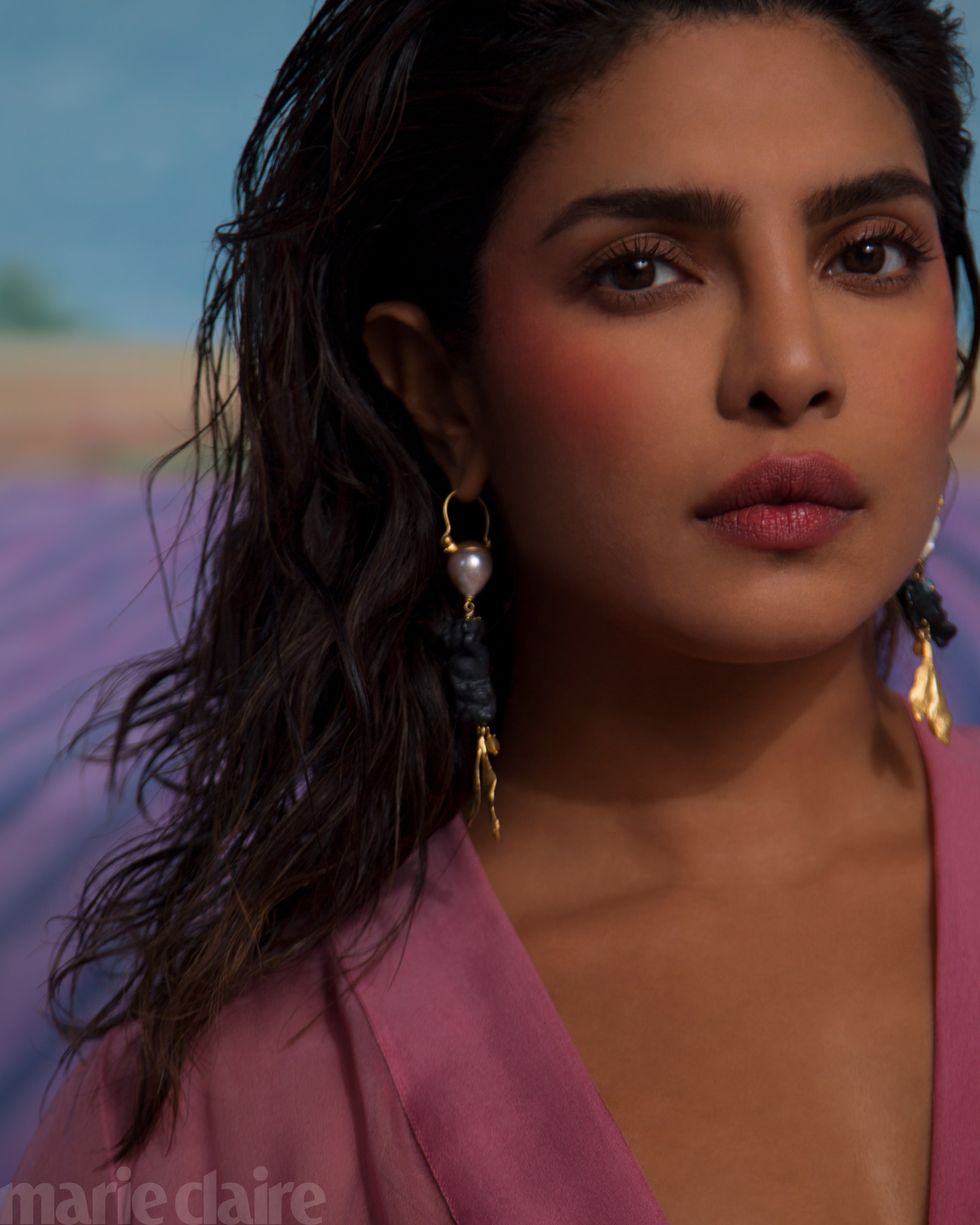
Dior dress and earrings
Ramin Bahrani, the director of The White Tiger, experienced Chopra Jonas’s conviction as she fought for the role of Pinky Madam, the film’s only leading female part. Chopra Jonas, an avid reader, had devoured the Booker Prize–winning novel by Aravind Adiga that the movie is based on, an examination of poverty and class struggles in modern-day India. “I couldn’t put the book down; it made me uncomfortable, embarrassed,” she says. When she learned it was going to be made into a movie with Netflix, she immediately reached out to her agent.
“I asked Priyanka if she would be willing to read a little bit with me. It was a scene that had been hard for people auditioning for that role, and no one could quite land it. She tried something very unusual that I didn’t think worked. I said, ‘Maybe you want to try something different?’ Instead, she just did the same thing even more, and somehow, by doubling down on it, it worked,” Bahrani says. “I was so surprised and taken aback at an actress who was able to nail that on her own because of her own instinct.”
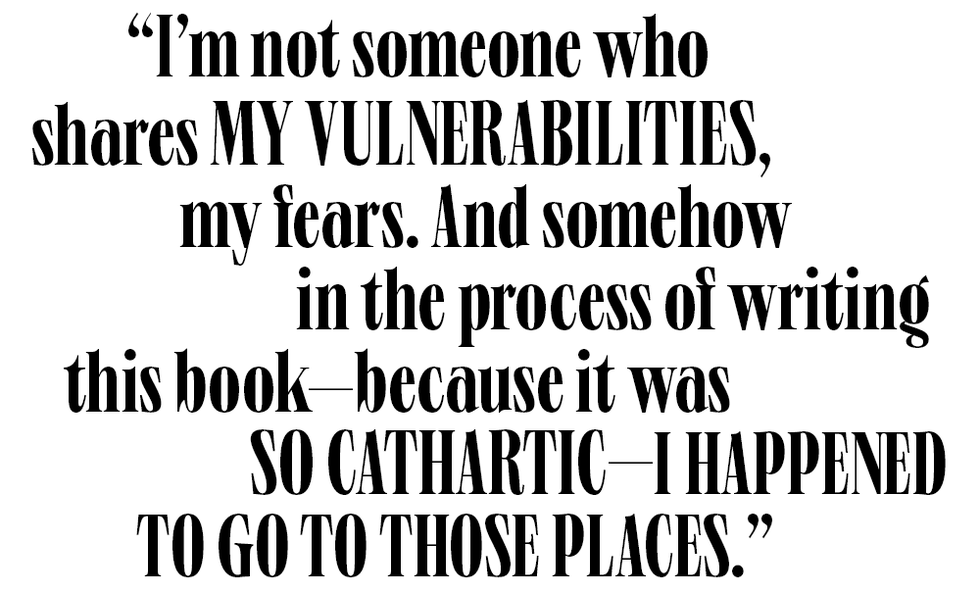
The scene Bahrani speaks of is a standout in the film, and it will likely surprise American fans who know Chopra Jonas for her lighter fare, like Baywatch (2017) and Isn’t It Romantic (2019). Instead of offering booming special effects or a saccharine love story, The White Tiger speaks to conversations relating to access and power. Chopra Jonas believes those themes will resonate with audiences.
“I don’t think it’s about the country,” she says of its subcontinental setting. “It’s about hunger, it’s about ambition, and it just happens to be placed in India. It could be in any other developing economy or a place where there is poverty. It just goes to show when you have an empty belly, what that can do to a man. To me, it’s a metaphor for desire and how far you go to get it.”
In the past, the actress was reticent to speak out about such controversial topics. As a newcomer in Bollywood, she was encouraged to be seen and not heard. And while Chopra Jonas never agreed with that notion, she didn’t want social-media posts or asides in interviews to detract from her actual work. But that doesn’t mean she didn’t have big ideas. “My dad used to say to me, ‘Whether or not you do something about your opinion, you need to have one. You always have to have an opinion,’” she says. “It inculcated independent thought.”
Still, Chopra Jonas acknowledges she didn’t always express those opinions as she should. In Unfinished, for the first time publicly, she shares the deep remorse she has about promoting skin-whitening creams, which she did when she was exclusively working in Bollywood. Although the last campaign wrapped almost 10 years ago, her participation is routinely brought up in discussions about how skin lighteners promote colorism and racism, a topic that reached a fever pitch in America last summer following the deaths of George Floyd, Ahmaud Arbery, and Breonna Taylor.
“[Skin lightening] was so normalized in South Asia; it’s such a large industry that everyone was doing it. In fact, doing it is still a check [mark] when you are a female actor, but it’s awful,” she tells me. “And it was awful for me, for a little girl who used to put talcum-powder cream on my face because I believed that dark skin was not pretty.” In Unfinished, Chopra Jonas recalls being called “dusky” by industry influencers and the media.
Her new sustainable beauty brand, Anomaly, is a metaphor for the self-acceptance she’s finally found. She is hopeful that men and women today don’t feel like they have to live up to the restrictive beauty standards that she used to. “I’m an anomaly, and everyone else is in their own way,” she says.
Chopra Jonas may have titled her book Unfinished, but 2020—and, really, the 20 years before that—taught her that it’s okay to be happy with what she’s already accomplished. “For that girl who was so scared, I’m proud of the person that I evolved into. I dealt with a lot, and I came out thriving,” she says. “I want little girls around the world to think about that. It doesn’t matter where you come from; it doesn’t matter what your circumstances are. Your grit matters, your ambition matters, your perseverance matters.” Qualities she has no shortage of.
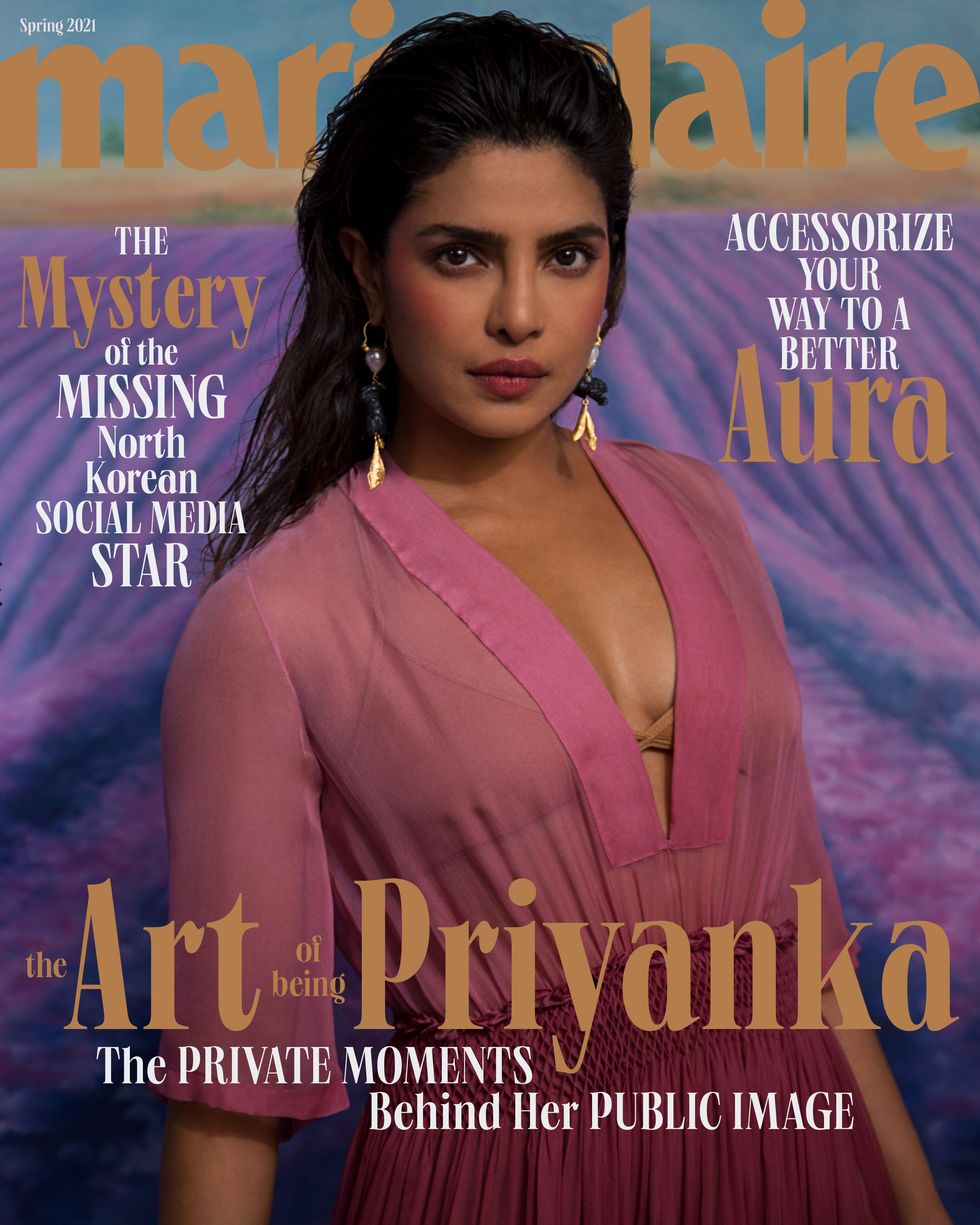
This article originally appears in the spring 2021 issue of Marie Claire.
Photographer: Ruth Ossai | Fashion Editor: Joanna Schlenzka | Hair: Issac Poleon | Makeup: Ninni Nummela for Dior | Manicure: Michelle Humphrey | Set Design: Joanna Goodman | Production: Lucy Watson Productions